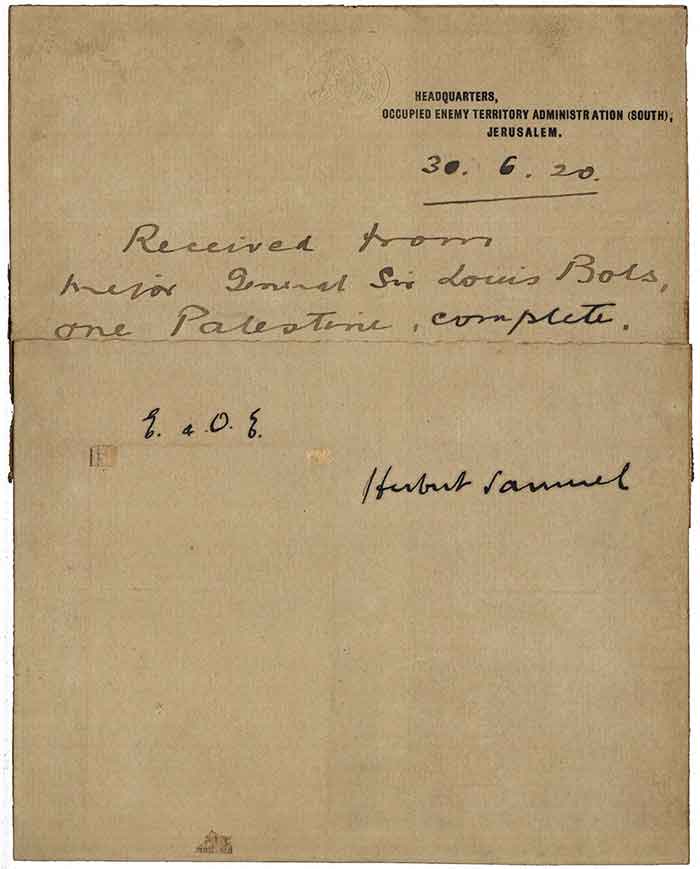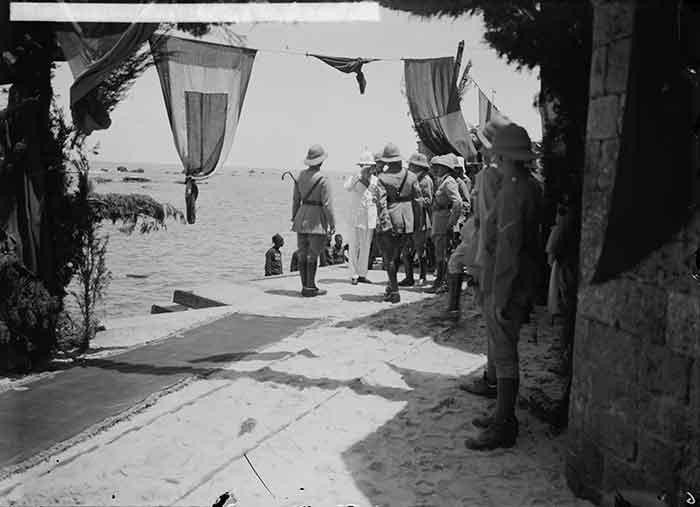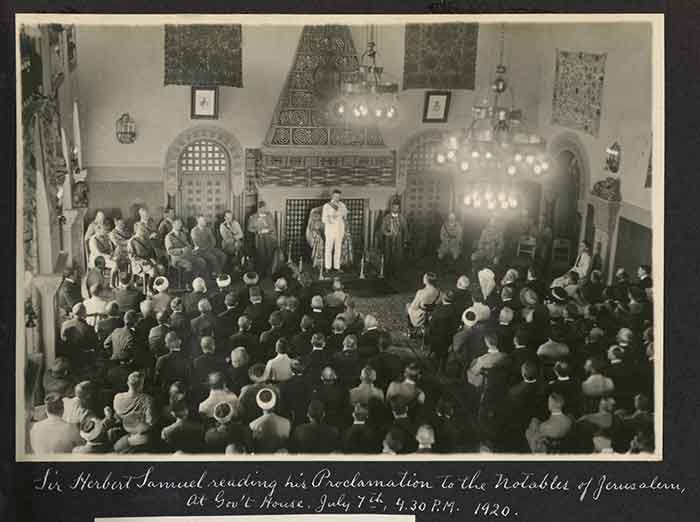
The only traceable copy of the document, though not the one commonly quoted. (The Klau Library, Hebrew Union College)

Jaffa, June 20, 1920, Herbert Samuel’s arrival in Palestine, ten days before the end of military rule and the beginning of his tenure as High Commissioner. (Library of Congress)

Original hand-written title: Sir Herbert Samuel reading his Proclamation to the notables of Jerusalem, at Gov’t House. July 7th, 4:30 P.M. 1920. (Library of Congress)
On June 30, 1920, Major General Sir Louis Bols, Chief Administrator of what was then the British military occupation in Palestine, handed a slip of paper to Sir Herbert Samuel, who at midnight would replace him in the form of Palestine’s first High Commissioner. The slip of paper was a mock receipt for what Bols was about to hand over. It read:
“Received from Major General Sir Louis Bols, one Palestine, complete.”
Posterity has spun this note, its final three words now famous in Zionist history, as a joke, a colonial prank. But history suggests something different. It was a joke, yes; but a bitter one, a protest, an indictment. Bols, in short, was not laughing.
Four hundred and four years earlier, in 1516, the Ottomans took over Palestine. They occupied the land for four centuries, minus an eight-year interruption: Palestine was conquered by Egypt in 1832, then restored back to the Ottomans by the British in exchange for concessions. But in December 1917, it was the British themselves who invaded Palestine, now ousting the Ottomans. Britain’s three-decade occupation of historic Palestine began.
The occupation was at first a military one, operating under the laws of Occupied Enemy Territory Administration (OETA), in which the status quo of the land must not be altered. In theory, the occupiers served as caretakers during the void in any national authority. But those attempting to uphold this principle, such as Louis Bols, were stymied by a force that sought to do precisely the opposite: Zionism, a movement newly-emboldened by the signing of the Balfour Declaration one month before the British conquest.
Armed with this pseudo-legal “mandate”, Zionist advicates sought to radically alter the status quo of the occupied land. As the British war correspondent J.M.N. Jeffries reported at the time, “the laws of war and of military occupation” could not be abrogated simply “because these did not fit in with the policy of [then Prime Minister] Mr. Lloyd George and of Lord Balfour,” that is, of Zionism.
Major General Bols, however, could not entirely stop them from circumventing the law.
“It is no use,” he complained of Zionist interference in Palestine, to tell the Christian and Moslem natives of the land that the status quo has been observed, because “facts witness otherwise.” Despite their denials, the Zionists “will be satisfied with nothing less than a Jewish State and all that it politically implies.”
He was sufficiently alarmed to bring his concerns to the British Cabinet, warning of the “untenable” situation Palestine would face “if the policy outlined by Dr. Weizmann in Cannon Street were followed,” referring to Chaim Weizmann, the most prolific activist for the Zionist cause at the time, a principal advocate for the Balfour Declaration and who would become Israel’s first president. That “policy” for Palestine included employing “exclusively Jewish labour” and handing over Government lands “to the Zionist Organization,” all toward the ultimate goal of forcing out the Palestinians themselves.
And so the Zionists sought to hand stewardship of Palestine over to a regime friendly to its aspirations, what would be the British Mandate. But this could happen only if such a Mandate were approved by post-war agreements and codified by the League of Nations — and that did not happen until July 1922, two years after “one Palestine, complete” was handed over to a proven advocate for the Zionist project, the very choice of Weizmann: Herbert Samuel. Indeed, Weizmann bragged of his role in influencing Samuel’s selection.
None of this squares with the interpretation of Bols’ “receipt” as a joke. Whatever one thinks of the British invasion and military occupation, Bols took seriously his obligation to protect Palestine’s status quo. We know that he was vehemently and vocally opposed to what the Zionists wished to do to the land, and he now faced the premature termination of whatever resistance he had been able to enforce. The “proof-of-sale” he demanded was no facetious whim. He was angry, and the physical object itself adds to the imagery of a sardonic ritual.
My reconstruction of the event follows:
Major General Bols writes the date on official stationery embossed with the seal of Great Britain, then “Received from Major General Sir Louis Bols” and quantity of the merchandise — one — followed by the name of the item — Palestine — as if Samuel were purchasing a commodity or widget that upon his signature would be his to do with as he pleases.
But Bols stops after “Palestine”. Note in the image of the document that what follows “Palestine” is peculiar: the word “complete” is written with the black pen used by Samuel, not the pen otherwise used by Bols; the word itself is not on the same horizontal plane as the preceding two words; and the comma and period before and after it are oddly spaced.
These anomalies indicate that after writing “Palestine”, Bols adds a comma, leaves a wide space, adds a period, then puts his pen down and takes Samuel’s bolder pen to write “complete” in the space he’d left blank. Bols was emphasising that Samuel was getting his prize in its entirety — a land that was 90% vociferously anti-Zionist, sold-as-is without warranty, buyer beware.
He then hands the black pen back to Samuel to sign. But Samuel, in his own little protest, adds a disclaimer used in business transactions to limit liability: E. & 0.E., “errors and omissions excepted.”
The British Mandate effectively — but not legally — began at midnight. The day after that, July 2, Samuel was received in Jaffa with a thirty-one gun salute, and on the 3rd he took up residence on Jerusalem’s Mount of Olives in a palace built by Kaiser Wilhelm of Germany.
Forty years later, on March 2 1960, Bols’ “bill-of-sale” for Palestine was purchased at a Parke-Bernet Galleries auction for $5,500 by the Carnegie Bookshop for the Klau Library in Cincinnati. Learning of the extraordinary price — $48k in 2020 dollars — Samuel, then 97, expressed outrage. The receipt was a joke, he said, not a historical document.
The document sold that day and illustrated here presents a further question, because it is not the one commonly quoted. The one commonly quoted, including by Tom Segev in his book One Palestine, Complete, has the addition of “K.C.B.” (Order of the Bath?) and a dash after Bols’ name:
Received from Major General Sir Louis J. Bols, K.C.B.— One Palestine, complete.
Yet I could find no record or image of that copy. Indeed I could not even find mention that there is a disparity in wording.
As June 30 2020 marks one hundred years since Samuel’s signature symbolically transferred stewardship of Palestine from one nonowner to another, the document’s odd word “complete” is ever more prescient, as Israel threatens to formally annex more of Palestine toward its everconstant end-game: One Israel, complete.
But the century-old note’s ultimate twist will come when it is Palestine that will again be “one” — and complete.
————————-
Note: Samuel, in his Memoirs (1945), states that Bols “wanted me to sign” the receipt. “He had a fund of humor which gave rise on this occasion to a little incident at the end of our conversation that has found its way into print,” Samuel wrote.
My thanks to Ghada Karmi, with whom a socially-distanced conversation in her garden first piqued my further interest in the document; Tom Segev, for his helpful reply to my email inquiry; and Dr. Jordan Finkin of the Klau Library, part of Hebrew Union College Jewish Institute of Religion, who kindly supplied me with a high resolution image of the document.
Sources consulted and quoted:
• The Klau Library, Hebrew Union College, for the original document used here.
• Jewish Telegraphic Agency, March 4, 1960, regarding the 1960 auction sale
• J.M.N. Jeffries, Palestine The Reality, p368, 333, 359, for the quotes of Louis Bols, the boasts of Weizmann in the selection of Samuel, and general contemporary reporting about the surrounding events
• Ilan Pappe, A History of Modern Palestine, p 67, regarding Samuel assisting Weizmann with his “propaganda campaign”
• New York Times, July 4, 1920 (“Samuel in Palestine”) for Samuel in Jaffa
• New York Times, July 5, 1920 (“Samuel in Jerusalem”) for Samuel in Jerusalem
• New York Times, March 3 1960 (“Chit for Nation Sold”) regarding the 1960 auction and the reference that Samuel “signed it after protest”
• Tom Segev, One Palestine, Complete, Kindle Edition, ch 7, at location 2970, where he references the incident, and endnote 36, describing Bols’ reaction to the auction sale, in turn referencing “Samuel to Turner, 5 Dec. 1959 and 16 Mar. 1960. ISA P/1 650/35”
• Tom Segev, email correspondence with the author, June 2020, inquiring about the apparent existence of two copies and that the one he cites is not the “known” copy
Thomas Suárez’s book State of Terror was described by Ilan Pappé as “the first comprehensive and structured analysis of the violence and terror employed by the Zionist movement and later the state of Israel against the people of Palestine.” A Juilliard-trained violinist who has performed around the world, he is a former faculty member of Palestine’s National Conservatory of Music.
SIGN UP FOR COUNTERCURRENTS DAILY NEWSLETTER











































